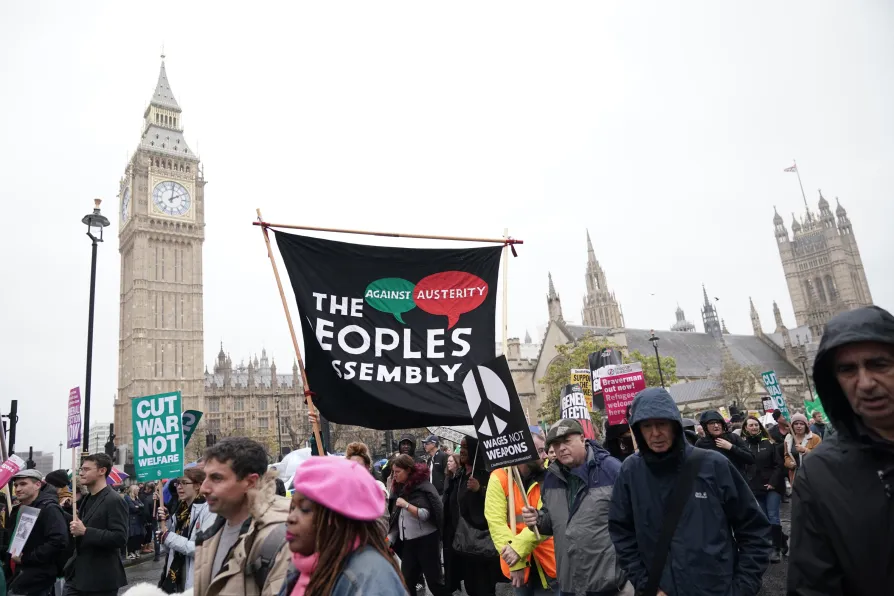
 People take part in the People's Assembly Britain is Broken national demonstration in central London, November 5, 2022
People take part in the People's Assembly Britain is Broken national demonstration in central London, November 5, 2022
ON WEDNESDAY Chancellor Rachel Reeves will announce spending plans for the next few years.
Apart from the military — promised lavish increases in funding that will be funnelled into the super-profits of corrupt and extortionate arms companies — Labour’s message has been one of cutting spending.
Cuts across government departments. Cuts to school funding, and a refusal to cover the cost of pay awards. The latter applies in the NHS too, where doctors and nurses are already being laid off despite waiting lists for treatment exceeding seven million.
Cuts across local government, which in Birmingham include direct cuts to the pay of bin workers — pursued by a Labour council on the orders of government-appointed commissioners. Cuts to social security, with the Department for Work & Pensions planning to withdraw billions in essential support for disabled people.
All this aimed at people, and public services, battered by 14 years of Tory attacks. When Britain urgently needs a change of course, Reeves prescribes another deadly dose of Tory ex-chancellor George Osborne’s marvellous medicine — that which brought us the collapsing NHS, crumbling schools, overcrowded prisons, clogged-up courts and all the other symptoms of Britain’s system failure.
Cuts to winter fuel payments and keeping the Tory two-child benefit cap have already proved politically explosive. The government, bruised by disastrous local election results, signalled a very partial retreat: the Prime Minister revealed he would “like to” lift the two-child cap, and eligibility for winter fuel payments will be tweaked, we don’t know exactly how.
The shift is so far more rhetorical than real. As we take to the streets for the national People’s Assembly demonstration against austerity, we must ensure the government hears loud and clear that the labour movement demands a different course — welfare not warfare, investment not cuts, taxes on profits and the rich, not on workers and the poor.
Starmer and Reeves have shifted under pressure from Labour MPs, increasingly panicked about re-election given their dismal poll ratings and the rise of Reform UK. The leadership will try to use Labour’s unexpected win in the Hamilton, Larkhall and Stonehouse by-election to the Scottish Parliament to say it is turning a corner.
It would be a foolish Labour MP or councillor who took much comfort from that, especially south of the border.
Labour’s by-election win, a bit like its general election win last summer, involved it winning fewer votes than it did the time before — 8,559 votes, when in 2021 it lost with 12,179 (its share of the vote fell too).
Because the Scottish National Party vote dropped dramatically — from 46 to 29 per cent — Labour scraped a win, but it has not gained support in Scotland but lost it.
A win with 31 per cent against 29 per cent for the SNP and 26 per cent for Reform UK is not decisive, and says more about the uneven impact of Reform’s vote on that of the Establishment parties than about Scottish Labour’s appeal.
The SNP’s shrunken vote shows it is suffering from the now near-universal resentment of those Establishment parties, having been in government in Scotland for 18 years. Labour benefited, as it benefited from the rejection of the Conservatives last year, but Labour is in power now and there is no alternative government to blame in England. The party is still on course to lose the next election unless a decisive change of direction is forced.
That cannot be left to MPs. The gulf between Westminster and the people is bigger than ever. It is external pressure — from the grassroots, through the unions, on the streets — which will make a return to austerity impossible, just as it has made British government support for Israel’s war on Palestinians ever more difficult. Tomorrow’s demonstration is a warning to Starmer and Reeves, but it must only be the start.










